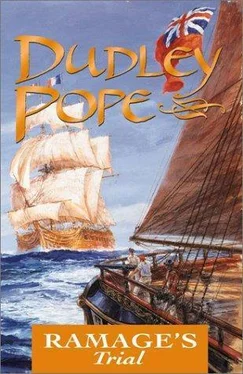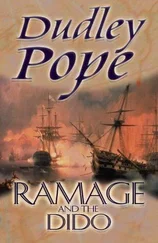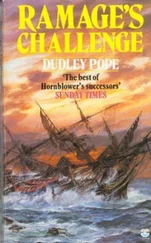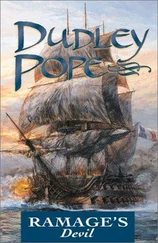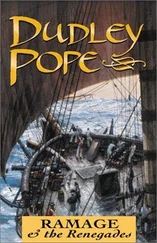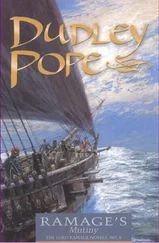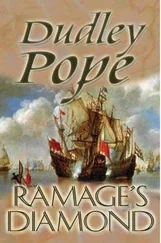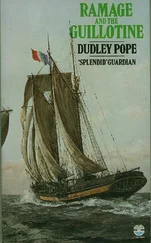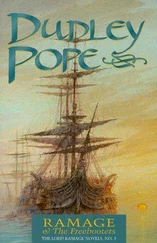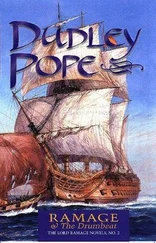DUDLEY POPE
Ramage's Trial
(#14 in Ramage series)
For the Ballengers with thanks
Southwick walked slowly across the quarterdeck to where Ramage stood trying to find some shade from a small awning which, having done so much service in the Tropics, now comprised more patches than original cloth and in places was so threadbare from sun and wind that it provided only a little more shade than a piece of muslin.
"This current is stronger than I'd allowed for," the master said. "I'd be glad if you'd make up your mind in the next few hours, sir, because it might save us a hard beat against both wind and current ..."
Ramage nodded agreeably because in fact he had at last decided. The choice had been simple - they had sailed northwest along the South American coast from French Guiana, shepherding their two prizes captured off Devil's Island, and he had to decide whether to make for Barbados or Antigua.
Barbados, being further out in the Atlantic, a sentry box guarding the Windward and Leeward Islands running north and south like a fence dividing the Caribbean from the Atlantic, meant they had to turn a point or two to starboard and hope that the flagship of the admiral commanding "His Majesty's ships and vessels upon the Windward Island station" was anchored in Carlisle Bay.
With luck the admiral would be very short of frigates and only too glad to buy in the two prizes to add to his force - no commander-in-chief ever had enough frigates, and two unexpected prizes coming up from the south would be like a quart of fresh water to a parched man.
The admiral might let the Calypso sail at once for England - he should, since she was sailing under another admiral's orders. However, many convoys assembled at Barbados for the long haul across the Atlantic to England, and what admiral could resist ordering an extra homeward-bound frigate to join the escort? Ramage guessed that, even worse, few if any admirals could resist putting Captain Ramage in command of a convoy and escort, which would mean a long and tedious voyage home.
Antigua, the alternative choice, was likely to have the other admiral there, the one commanding the King's ships on the Leeward Islands station. Whoever he was at the moment - Ramage seemed to recall that it was Hervey - would be in a very bad temper because he probably had his flagship in English Harbour, which with its mosquitoes, unpleasant and windless anchorage, and notoriously corrupt dockyard staff, made most officers rage against it. One of the most vocal had of course been Rear-Admiral Nelson (when a captain), whom Ramage once remembered getting very angry over the corruption of the Antigua merchants who were busy trading with the Americans in clear defiance of the Navigation Acts. Ramage recalled the long days and nights spent in English Harbour refitting the Calypso after capturing her from the French and the constant rows with the master shipwright, master attendant, boatswain and (worst of all) the "storekeeping and naval officer", each of whom regarded the King's stores as personal investments upon which they could draw, selling cordage, canvas (and probably even spars) to merchant ships, illegally and at grossly inflated prices. Men who were likely to know reckoned that the dockyard minions vied with local businessmen for the size of their profits -with the advantage that they took no risk (the King's stores being delivered there in the King's ships) and faced no competition: a merchant ship with blown-out sails was forced to buy more canvas; those with sprung masts or yards rarely carried any spares and the master might visit the dockyard with a sorry story but he had to have hard cash in his purse.
After all the strain of the past few weeks, which had started when he had been forced to leave his new bride on board one of the King's ships off Brest as the Treaty of Amiens collapsed and war started once again, Ramage decided he could not face the heat, stink and corruption of English Harbour. He turned to Southwick. "Make it Barbados," he said. The master, his white hair streaming in the wind like a freshly dried mop, gave a knowing grin. "I'd already put my money on it, sir, and took the liberty of keeping up to windward. Is it all right if I pass the word to the ship's company, sir? Most of them hate Antigua, too, but they like Barbados, even if it does mean a convoy for us."
He waved towards the two prize frigates following the Calypso, one on each quarter. "It's been a profitable voyage for the lads – I reckon they're a fair way to becoming the wealthiest seamen in the Navy. You don't often come home with less than a couple of prizes!"
"That makes you one of the Navy's wealthiest masters!" Ramage said, teasingly.
"Reckon I am," Southwick said cheerfully, "and all of it safe in the Funds."
Ramage's curiosity overcame his usual tact. Southwick had served with him from the day he was given his first command (it seemed so many years ago that a very young Lieutenant Ramage was given seemingly impossible orders by Commodore Nelson, and by a glorious stroke of luck had managed to carry them out successfully). Now he and Southwick shared the bond that comes from having death beckon them many times. "Who inherits the Southwick riches?"
Southwick looked so embarrassed that Ramage could have bitten his tongue. "My sister (as you know, she's my only living relative, and she's been a spinster all her life), well, she's provided for, so she'll never need again, and then what's left will be a sort of thank you." With that the master excused himself, saying he had some more work to do on the chart.
The three seamen sitting at the table were chatting and teasing each other with the easy familiarity that comes from often-shared dangers. The tall, sandy-haired man who had a natural authority ran his fingers through his thinning hair. "So it's Barbados," he commented. "I guessed the captain wouldn't choose Antigua, after the trouble we had refitting this ship there."
"Nor me neither, Jacko," said Stafford, the Cockney in the trio. "Not after the way those dockyard people behaved. Reckon they're rich men now, on the Calypso alone. Nasty lot, they are; they've turned on their own people."
"But the Calypso's, just one of dozens of ships," said the plump, black-haired man whose accent betrayed his Italian origins. "They all get cheated."
Rossi, known to most of his shipmates as Rosey, in fact came from Genoa and was a volunteer in the Royal Navy, although since Bonaparte had later turned Genoa into the capital of the Ligurian Republic, the French might now claim that Rossi was a traitor to the French cause. Ramage had always assumed Rossi's original departure from Genoa was connected more with disagreement over the law rather than any personal disagreement with Bonaparte's politics. Not that it mattered; he was a fine seaman with uncomplicated loyalty: he was loyal to his friends (who were serving in his ship) and particularly Jackson and Stafford. He reserved for Captain Ramage what a priest (if Rossi had ever talked to one, which was doubtful) would call idolatry. Ramage's fluent Italian - he could mimic most of the regional accents - and deep love and knowledge of Italy made him Rossi's liege lord, if such things still existed.
"Still," Stafford said cheerfully, "the Calypso's made us rich too. And the Triton brig before her, and then the Kathleen cutter."
"Ah," Jackson interjected, "they've made us rich because we've risked our necks: we've used them to kill Frenchmen and capture their ships. If there's no risk, there's no profit; I've learned that much. But what did the storekeeper at English Harbour ever do to justify making a penny out of us? Or the boatswain, or the master shipwright, and all the rest of that sticky-fingered crowd of time-servers who are always lurking around there? Still, yellow jack or blackwater fever might yet take 'em off before they get home to spend their loot. It's an unhealthy spot, Antigua. Especially English Harbour, which has a fine cemetery ready for 'em. Come to think of it, some of the early ones must be there already!"
Читать дальше
